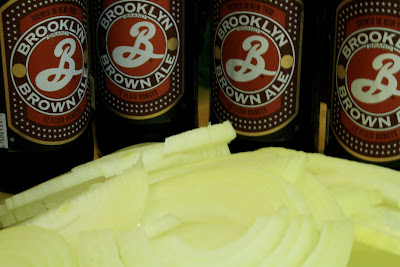short rib showdown: beer vs. wine
Short ribs are pretty much my favorite thing to braise when it's cold out. They are perhaps the main reason that beef will always win out as my favorite meat, despite my deep appreciation for all things porky. I have two favorite recipes for braising short ribs - one with red wine, and one with beer. I tend to prefer the red wine recipe, J-Cat prefers the beer recipe. This is pretty much the opposite of our actual drinking tastes, where I prefer beer and he prefers wine. I find that strange. In any case, I do love both recipes and since I will likely braise short ribs at least a few times this winter, this time I went for the beer braising because, well, I had beer in the fridge.
The key to this recipe is the combination of tons and tons of onions and a dark beer. The bitterness of the beer, the sweetness of the onions, and the profound beefiness of the short ribs is a truly glorious combination.
I, of course, eat this over rice, as I do with pretty much everything. You do want something to soak up the beery, oniony, beefy sauce. Obviously, mashed potatoes or bread would work just as well. Recipe after the jump:
BEEF SHORT RIBS BRAISED IN BEER
from "Staff Meals from Chanterelle" by David Waltuck and Melicia Phillips
3/4 cup canola or other vegetable oil
5 to 6 pounds beef short ribs, trimmed of fat
4 large onions, halved lengthwise and cut crosswise into thin slices
2 tablespoons sugar
2 tablespoons all-purpose flour
4 bottles (12 ounces each) dark ale or beer
8 cups chicken stock
4 bay leaves
Coarse (kosher) salt and coarsely ground black pepper, to taste
Heat 1/2 cup of the oil in a very large, heavy, flameproof casserole or Dutch oven over medium-high heat. Add only enough of the short ribs to fit into the casserole without crowding and brown well on all sides, 4 to 5 minutes per side. As the ribs are browned, transfer them to a platter and continue browning the remaining ribs in batches.
When all the ribs are browned and removed from the casserole, discard the oil from the casserole, but do not wash it (you want to keep those flavorful brown bits). Return the casserole to the stove. Add the remaining 1/4 cup oil and the onions and cook slowly, covered, over low heat until the onions are very soft but not browned, about 20 minutes.
Uncover the casserole and sprinkle the sugar over the onions. Cook, uncovered, stirring occasionally, until the onions have caramelized slightly and are just light brown in color, about 5 minutes. Sprinkle the flour over the onions and continue cooking stirring frequently, until the flour turns light brown, 3 to 4 minutes. Add 1 bottle of the beer and increase the heat to medium high. Bring to a boil, scraping the bottom of the casserole with a wooden spoon to loosen any browned bits.
Return the ribs to the casserole along with the stock, remaining beer, and bay leaves. Bring to a boil, skimming the top occasionally, then reduce the heat to low and cook, tightly covered, until the meat is very tender, 1 1/2 to 2 hours; you should be able to pull the bones from the meat with ease. Using tongs, transfer the ribs to a platter and let cool.
While the ribs cool, check the liquid in the casserole. If it's thick enough to coat the back of a spoon, it's ready to use as a sauce. If not, increase the heat to medium and reduce the liquid until it reaches the proper thickness. This may take up to an additional 15 minutes. Taste; the sauce should be slightly bitter, with a subtle, balancing touch of sweetness from the caramelized onions. Season with salt and pepper; remove and discard the bay leaves.
When the ribs are cool enough to handle, remove the meat from the bones. Discard the bones and return the meat to the casserole. Simmer until heated through, about 5 minutes. If you'll be serving immediately, skim the fat from the surface of the sauce; otherwise, refrigerate overnight and remove the hardened fat before reheating.




No comments:
Post a Comment